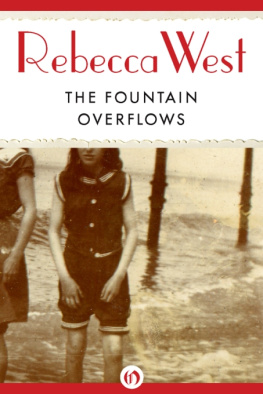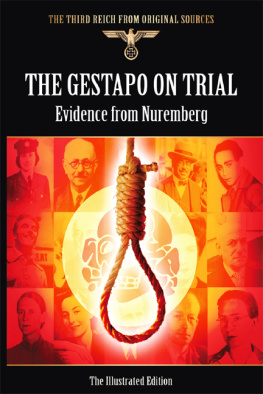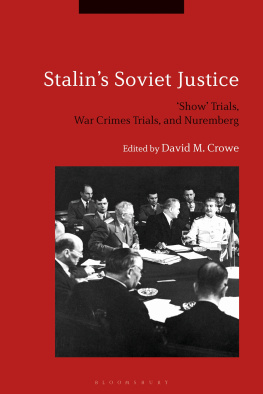A Train of Powder
Rebecca West

To Margaret Rhondda with deep affection
CONTENTS
There rushed up towards the plane the astonishing face of the worlds enemy: pine woods on little hills, grey-green glossy lakes, too small ever to be anything but smooth, gardens tall with red-tongued beans, fields striped with copper wheat, russet-roofed villages with headlong gables and pumpkin-steeple churches that no architect over seven could have designed. Another minute and the plane dropped to the heart of the worlds enemy: Nuremberg. It took not many more minutes to get to the courtroom where the worlds enemy was being tried for his sins; but immediately those sins were forgotten in wonder at a conflict which was going on in that court, though it had nothing to do with the indictments considered by it. The trial was then in its eleventh month, and the courtroom was a citadel of boredom. Every person within its walk was in the grip of extreme tedium. This is not to say that the work in hand was being performed languidly. An iron discipline met that tedium head on and did not yield an inch to it. But all the same the most spectacular process in the court was by then a certain tug-of-war concerning time. Some of those present were fiercely desiring that that tedium should come to an end at the first possible moment, and the others were as fiercely desiring that it should last for ever and ever.
The people in court who wanted the tedium to endure eternally were the twenty-one defendants in the dock, who disconcerted the spectator by presenting the blatant appearance that historical characters, particularly in distress, assume in bad pictures. They looked what they were as crudely as Mary Queen of Scots at Fotheringay or Napoleon on St. Helena in a mid-Victorian Academy success. But it was, of course, an unusually ghastly picture. They were wreathed in suggestions of death. Not only were they in peril of the death sentence, there was constant talk about millions of dead and arguments whether these had died because of these men or not; knowing so well what death is, and experiencing it by anticipation, these men preferred the monotony of the trial to its cessation. So they clung to the procedure through their lawyers and stretched it to the limits of its texture; and thus they aroused in the rest of the court, the people who had a prospect of leaving Nuremberg and going back to life, a savage impatience. This the iron discipline of the court prevented from finding an expression for itself. But it made the air more tense.
It seemed ridiculous for the defendants to make any effort to stave off the end, for they admitted by their appearance that nothing was to go well with them again on this earth. These Nazi leaders, self-dedicated to the breaking of all rules, broke last of all the rule that the verdict of a court must not be foretold. Their appearance announced what they believed. The Russians had asked for the death penalty for all of them, and it was plain that the defendants thought that wish would be granted. Believing that they were to lose everything, they forgot what possession had been. Not the slightest trace of their power and their glory remained; none of them looked as if he could ever have exercised any valid authority. Gring still used imperial gestures, but they were so vulgar that they did not suggest that he had really filled any great position; it merely seemed probable that in certain bars the frequenters had called him by some such nickname as The Emperor. These people were also surrendering physical characteristics which might have been thought inalienable during life, such as the colour and texture of their skins and the moulding of their features. Most of them, except Schacht, who was white-haired, and Speer, who was black like a monkey, were neither dark nor fair any more; and there was amongst them no leanness that did not sag and no plumpness that seemed more than inflation by some thin gas. So diminished were their personalities that it was hard to keep in mind which was which, even after one had sat and looked at them for days; and those who stood out defined themselves by oddity rather than character.
Hess was noticeable because he was so plainly mad: so plainly mad that it seemed shameful that he should be tried. His skin was ashen, and he had that odd faculty, peculiar to lunatics, of falling into strained positions which no normal person could maintain for more than a few minutes, and staying fixed in contortion for hours. He had the classless air characteristic of asylum inmates; evidently his distracted personality had torn up all clues to his past. He looked as if his mind had no surface, as if every part of it had been blasted away except the depth where the nightmares live. Schacht was as noticeable because he was so far from mad, so completely his ordinary self in these extraordinary circumstances. He sat twisted in his seat so that his tall body, stiff as a plank, was propped against the end of the dock, which ought to have been at his side. Thus he sat at right angles to his fellow defendants and looked past them and over their heads: it was always his argument that he was far superior to Hitlers gang. Thus, too, he sat at right angles to the judges on the bench confronting him: it was his argument that he was a leading international banker, a most respectable man, and no court on earth could have the right to try him. He was petrified by rage because this court was pretending to have this right. He might have been a corpse frozen by rigor mortis, a disagreeable corpse who had contrived to aggravate the process so that he should be specially difficult to fit into his coffin.
A few others were still individuals. Streicher was pitiable, because it was plainly the community and not he who was guilty of his sins. He was a dirty old man of the sort that gives trouble in parks, and a sane Germany would have sent him to an asylum long before. Baldur von Schirach, the Youth Leader, startled because he was like a woman in a way not common among men who looked like women. It was as if a neat and mousy governess sat there, not pretty, but with never a hair out of place, and always to be trusted never to intrude when there were visitors: as it might be Jane Eyre. And though one had read surprising news of Gring for years, he still surprised. He was so very soft. Sometimes he wore a German Air Force uniform, and sometimes a light beach suit in the worst of playful taste, and both hung loosely on him, giving him an air of pregnancy. He had thick brown young hair, the coarse bright skin of an actor who has used grease paint for decades, and the preternaturally deep wrinkles of the drug addict. It added up to something like the head of a ventriloquists dummy. He looked infinitely corrupt, and acted navely. When the other defendants lawyers came to the door to receive instructions, he often intervened and insisted on instructing them himself, in spite of the evident fury of the defendants, which, indeed, must have been poignant, since most of them might well have felt that, had it not been for him, they never would have had to employ these lawyers at all. One of these lawyers was a tiny little man of very Jewish appearance, and when he stood in front of the dock, his head hardly reaching to the top of it, and flapped his gown in annoyance because Grings smiling wooden mask was bearing down between him and his client, it was as if a ventriloquist had staged a quarrel between two dummies.
Grings appearance made a strong but obscure allusion to sex. It is a matter of history that his love affairs with women played a decisive part in the development of the Nazi party at various stages, but he looked as one who would never lift a hand against a woman save in something much more peculiar than kindness. He did not look like any recognized type of homosexual, yet he was feminine. Sometimes, particularly when his humour was good, he recalled the madam of a brothel. His like are to be seen in the late morning in doorways along the steep streets of Marseille, the professional mask of geniality still hard on their faces though they stand relaxed in leisure, their fat cats rubbing against their spread skirts. Certainly there had been a concentration on appetite, and on elaborate schemes for gratifying it; and yet there was a sense of desert thirst. No matter what aqueducts he had built to bring water to his encampment, some perversity in the architecture had let it run out and spill on the sands long before it reached him. Sometimes even now his wide lips smacked together as if he were a well-fed man who had heard no news as yet that his meals were to stop. He was the only one of all these defendants who, if he had the chance, would have walked out of the Palace of Justice and taken over Germany again, and turned it into the stage for the enactment of the private fantasy which had brought him to the dock.
Next page












